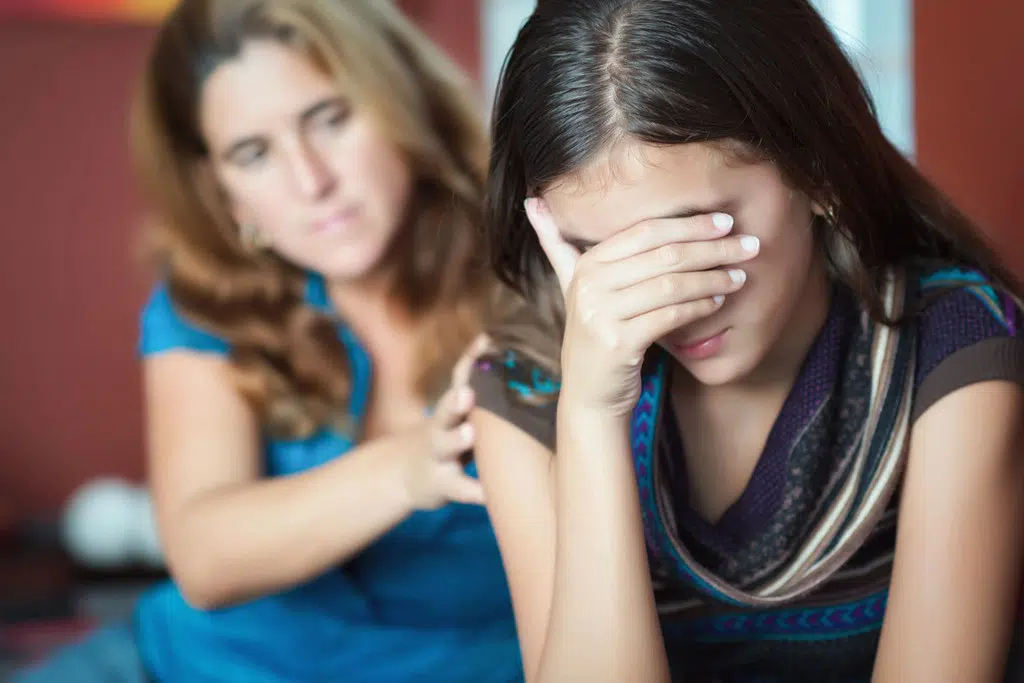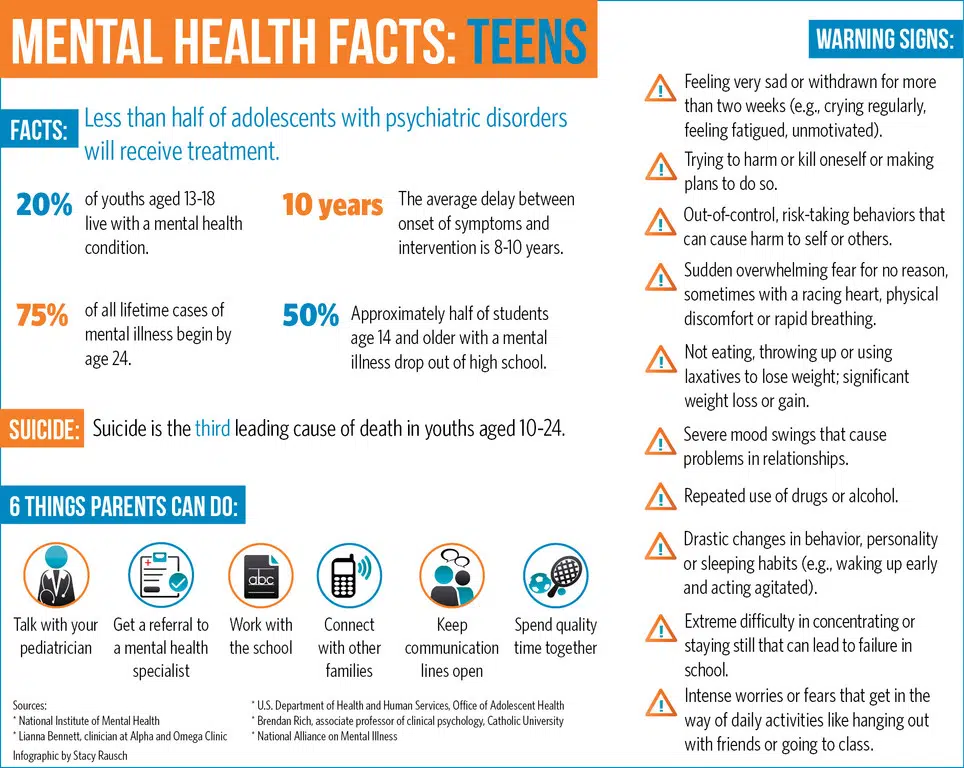A suicide reverberates with an added layer of loss and
heartbreak when the life ended was a young one. And there
have been many such deaths in the news recently.
On April 13, a College of William and Mary student killed
himself, the fourth to do so this year at the Williamsburg
university. Last year, Fairfax’s W.T. Woodson High School
grappled with its sixth suicide in a three-year span.
With suicide the third leading cause of death in youths ages
10 to 24, it is startling that less than half of adolescents
with mental health problems receive treatment, according the
U.S. Department of Health and Human Services’ Office of
Adolescent Health. While the majority of mentally ill teens
will not commit suicide, lack of professional help deepens
and prolongs suffering.
So what are the reasons for this lack of treatment, what are
the warning signs, how are diocesan high schools helping, and
what can parents do to offer support?
The silencing power of stigma
Local Catholic Angela Henderson’s daughter, Jane (names have
been changed to protect the daughter’s privacy), was
diagnosed with depression when she was 12. But it took the
family about a year to realize her symptoms were more than
normal teenage angst.
“At first we thought (her yelling and tears) might just be
typical teenage acting-out or hormones,” said Henderson.
The challenge of sorting out mental illness from typical teen
behavior is one reason for delayed treatment, or none at all,
said Alpha and Omega clinician Lianna Bennett. Alpha and
Omega Clinics, based in Maryland and Virginia, integrate
psychology with the Catholic faith.
Additional obstacles to treatment include poor access to
care, especially in rural areas, and the high cost of
psychological services, according to Brendan Rich, associate
professor of clinical psychology at Catholic University in
Washington. “Psychological services are not always seen as a
necessity by insurance companies,” Rich said.
However, mental health experts agree that the No. 1 reason
adolescents do not receive treatment is the stigma that still
surrounds mental illness. Some see psychological problems as
moral weakness or lack of self-control. Teens, naturally
prone to be more concerned about appearances, feel the weight
of such negative perceptions most acutely, Rich said.
Adolescents might even view a therapist’s office as “a place
where crazy people go,” said Bennett.
The stigma is intensified by the way media often link violent
behavior and mental illness.
“People with mental illness have the same level of aggression
and antisocial behavior as the general population, but
unfortunately we talk about mental illness usually only after
an antisocial, aggressive act,” Rich said, citing the recent
tragedy of the Germanwings co-pilot who was treated for
depression and last month crashed a plane killing 150 people.
According to HHS, only 3 to 5 percent of violent acts can be
attributed to mentally ill individuals.
To decrease stigma, Rich and Bennett encourage parents to
realize that mental illness, like physical illness, is not a
choice and to be cognizant of the language they use and
attitudes they convey when discussing it.
“If we view mental illness as a weakness or depression as
something people need to ‘get over,’ our children will be
much less likely to seek us out if they experience
struggles,” said Bennett. “We need to have compassion for
those who are struggling with mental illness; as our
understanding of the brain and neuroscience grows, we realize
that biology has a strong impact on mental health.”
“Once we started to be more open (about Jane’s depression),
we learned others had struggled with similar things, but had
kept it a secret,” Henderson said. “It was a relief to know
that we were not alone.”
Warning signs
It was a Sunday night and Jane decided a homework assignment
needed to be redone. Her distress grew into a tantrum that
continued to escalate.
“I was just holding her, her heart pounding, until her
breathing returned to normal,” Henderson said. “Afterward,
she said, ‘Mom, that was scary.'”
It was frightening for Henderson, too, and the panic attack
served as a catalyst for treatment.
Because adolescents typically don’t seek treatment on their
own, parents play a crucial role in identifying warning signs
and connecting teens with support, said Joel Sherrill,
program chief of the Child and Adolescent Psychosocial
Intervention Program at the National Institute of Mental
Health.
“There are expectations that teenagers assume more
independence and that their dependency on parents goes down,
… but parents are still very important in their
child’s life,” he said.
Warning signs include “a change in how a youth interacts with
peers, if they are becoming more withdrawn or if their class
work is suffering,” said Sherrill.
Additional indicators (see infographic) include a change in
sleep or eating patterns, difficulty concentrating,
tearfulness and not finding pleasure in activities once
enjoyed.
Symptoms vary depending on the nature of the mental illness,
with the most common illnesses being depression and anxiety
disorder. Teenagers also commonly struggle with eating
disorders; Internet addiction, including to pornography and
video games; self-harm, such as cutting; and the effects of
bullying.
For many of her young clients, at the core of their illness
is “a feeling of worthlessness,” said Bennett.
Schools on the frontlines
Along with parents, schools also can help teens emerge from
the darkness of mental illness.
“Schools often have a good sense of a student’s normal
functioning, and many schools … are the first step in
getting in touch with resources,” Sherrill said.
“Our teachers are very much on the frontlines and
encountering early symptoms,” said Dan Kochis, director of
counseling at Paul VI Catholic High School in Fairfax.
Not all youths feel comfortable initiating conversations
about problems with their parents, so teachers, coaches and
school counselors “offer them a chance to speak with other
adults they trust,” said Erin O’Leary, director of counseling
services at Bishop Ireton High School in Alexandria.
The diocesan Catholic Schools Office provides a list of
specialists based on suggestions from teachers and parents,
and several schools supplement it with additional resources.
If a family can’t afford treatment, the high schools often
refer them to Catholic Charities, which offers therapy on a
sliding scale.
Bishop O’Connell High School in Arlington hosted a mental
health expert on a professional development day to discuss
warning signs. Monthly coffees for parents often focus on
mental health, and a fall assembly addresses respect and
bullying.
Paul VI has a part-time pastoral counselor as well as a peer
mediation ministry. “If someone is struggling with
depression, we want them to know they are not alone,” said
Kochis.
All four diocesan high schools also offer something
intangible but equally important: a holistic sense of the
human person.
“Our Catholic mission is to form the mind, body and spirit,”
Kochis said. “If the whole person includes the cross of
mental illness, that’s OK. That’s the child of God and that’s
how they’ve been given to us, and we will support and provide
for them.”
“Being part of a community that cares, that responds and
prays makes all the difference,” added Tricia Laguilles,
director of guidance at Saint John Paul the Great Catholic
High School in Dumfries.
Partners in the struggle
Parents frequently blame themselves for their child’s mental
illness. “As a parent you wonder if they’d just had a happier
childhood, different parenting or if you’d prayed harder – if
that would have made a difference,” Henderson said.
Yet Bennett said parents should not blame themselves. A
mental illness “is not a sign that a family is bad or broken
or worse than any other family,” she said.
Of course family dynamics sometimes contribute to a teen’s
mental illness, said Bennett, but parents almost always are
integral to successful healing. The most important thing
parents can do, she said, is to ensure their teen receives
treatment.
Bennett encourages parents to talk with their child if they
believe something might be wrong. “Parents sometimes worry
that if you talk to them about depression or self-harm you’ll
put the idea in their head,” she said. “That’s false; it does
not increase the risk.”
Bennett said it’s important for parents to pay attention to
changes in mood and behavior and to continually work on their
relationship with the child. Take time to have fun with your
son or daughter, she said. “If they feel like you enjoy being
around them, they are more likely to open up.
“Teens can be rough around the edges sometimes. Our job as
adults is to not let them pushing our buttons activate us.
Remember, teens are going to say stupid things; our job is to
be steady for them.”
Faith can also be a powerful source of healing for
individuals with mental illness as well as those who support
them.
“Remembering that we are a child of God is important for all
diseases, but especially when dealing with mental illness,”
Henderson said.
It therefore was painful to realize that depression had taken
a toll on Jane’s faith. “With all the darkness she
experienced, she has a hard time believing in a loving God
…. and rejected anything church-related for a long
time.”
Henderson did not push her daughter to go to church, “but I
kept believing, and friends and family kept praying for her.”
Then about a month ago, Jane – now 15 and “relatively stable”
– said she wanted to try and go back to church. The family
went to Easter Mass together, attending an early service
since Jane struggles with social anxiety.
“Halfway through Mass, she snuggles into me and says, ‘This
is beautiful, Mom,'” said Henderson. “That was my Easter
gift.”
Henderson said she’s thankful for the treatment that’s helped
Jane emerge from the abyss of depression. And she’s also
deeply grateful for the ability to turn to God.
“There is struggle and pain like with any other disease,”
said Henderson. “Faith doesn’t cure the problem, but it is a
supportive companion. And it allows for these moments of
grace that come after the struggle.”
Mental health resources
Suicide hotline: 1-800-273-TALK (8255) or go here for a
live webchat
Alpha and Omega Clinic: 301/767-1733 or click here
Catholic Charities’ Family Services: 703/224-1630 or go here
National Alliance for the Mentally Ill: nami.org
Boys Town, a Catholic
organization with resources on parenting and child behavior





